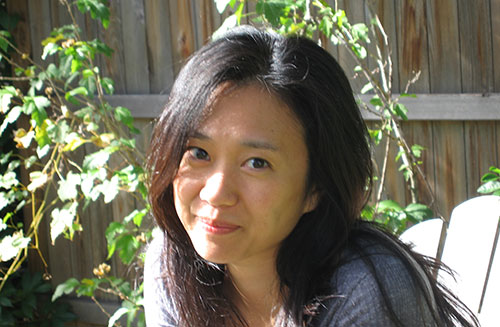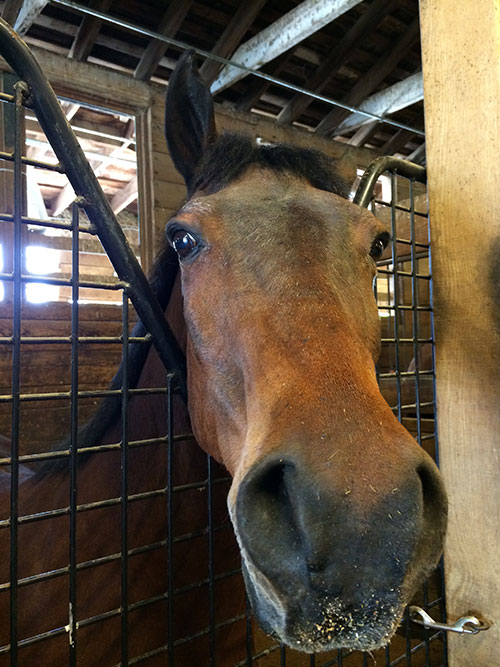On Writing 'A Horse Named Never'

Each month we feature a guest post from a contributor to Poetry’s current issue. Jennifer Chang’s poem, “A Horse Named Never,” appears in the October 2015 issue. Previous posts in this series can be found on the Editors’ Blog.
In fact, there is a horse named Never. In a narrow mid-row stall at Rock Creek Park Horse Center, he’s standing there now. He’s bay-colored and black-maned, sweeter in temperament than the Never depicted in my poem.
It was Emily’s idea to visit the stables. Two springs ago we’d met for dim sum in Silver Springs and, after a swift and tasty lunch, decided to keep the conversation going. One of us had mentioned horses, and I must have said “I love horses” because Emily starting telling us about a place where you could visit them stall by stall.
I had been stuck on a poem. Rather, I’d been asked to write a poem that I didn’t know how to write nor exactly want to. Lisa Russ Spaar was editing an anthology of contemporary poems on Monticello, the Virginia homestead of Thomas Jefferson, and was inviting poets to contribute new work. I couldn’t say no to a good friend like Lisa. However, my affiliation with Jefferson, Monticello, and the University of Virginia has been perennially ambivalent. I’d already written about this ambivalence for another anthology, one edited by Claudia Rankine on the racial imagination of writers, in an essay about the cultural, social, and personal burdens of teaching Jefferson’s “Notes on the State of Virginia” and other western canonical works as a person of color. To write a poem for Jefferson would seem only to feed into a Founding Father mythology that continues to be accepted far too uncritically. Of course, my companions that day didn’t know any of this because the assignment was my secret bugbear and no sane person wants to talk about poetry or American history when sharing a plate of shumai.
Never is a word one ought not use lightly. As a horse, he had a habit of leaning ever closer, imploring my affection, unafraid of human hands. I wondered what he was like out of captivity, if I might’ve passed him on a hiking trail, who owned him. Who names a horse Never? Was “Never” uttered with audacity—did his gallop hint at feral abandon? Or was “Never” like the measure of his stall, so narrow that he could not easily turn around?
I took a picture:

On the subject of never, it is impossible for me not to remember King Lear. Over Cordelia’s dead body, after the fool’s death, Lear makes his final statement: “Why should a dog, a horse, a rat, have life, / And thou no breath at all? Thou’It come no more, /Never, never, never, never, never.” This is a chorus of negation, a last breath, and it speaks back to all that’s come before. It is a regret, a refusal, an articulation. “Nothing will come of nothing: speak again,” Lear admonishes Cordelia in the first scene, when she cannot, will not, elaborate on her love for him. Never again.
You might say that never makes mortality explicit, but it also erects a mighty wall around our lives: never is both our power and our absolute powerlessness. I reject you, I deny myself; ceasefire, victory, and surrender all at once. “Never” says “nothing” emphatically, adverb to noun. As Edmund laments, “men are as the time is.”
I had been trying to write a poem by not writing the poem, and now I was face to face with a horse named Never. I felt a great tenderness. Why shouldn’t a horse have life?
Perhaps this question was meant for Jefferson. He kept careful record of his horses, as he did of all his property, including his slaves, a population that numbered over six hundred in his lifetime. In fact, there was a horse named Biscuit and a horse named Crab. Trapezoid, my massive midnight mare, I made up. Jefferson did, in fact, ride his horse as far as Panther Gap; which horse he rode he never names.
It didn’t matter whose backyard I stood in: if I saw a house on a hill, I assumed it was Monticello. The word is Italian, meaning “Little Mountain.”
I loathe to poeticize Jefferson, but he shares with Lear an attachment to property that outweighs an intuitive sense of natural law. In an earlier draft of “A Horse Named Never,” I slipped in the phrase “this deplorable entanglement,” one of his more fetching euphemisms for slavery. It’s since been cut, and rightly so. My first encounter with him was reading the Declaration of Independence in middle school, when I was just starting to write poems and I made note of what the teacher said: “he is a beautiful writer.”
I can’t say that I went home that afternoon and wrote the poem. Days passed when Never was nothing more than a horse. Even when I wrote down the title on a whim the assignment was far from my thinking. But I often think of King Lear when I’m on the precipice of writing, troubled as I am by the nothing at the core of all making. “Nothing comes of nothing: speak again.” I think of our violent demands on others to love us back, to voice a language intelligible to ourselves alone, to finally understand us, and I think about the omnipotence of silence, not for what it withholds but for the meaningful uncertainties it cultivates. Writing is hard. Knowing is hard. And it has been a hard time of terrible knowledge thanks in no small part to the extant legacies born of Jefferson and his kind. Why write a poem at all?
Yeats claims in his essay “Emotion of Multitude” that “We think of King Lear less as the history of one man and his sorrows than as the history of a whole evil time.” What this proves to me is how once again we’ve misread who’s the hero. Neither Lear nor Jefferson is the hero, neither should be emblematic of human experience, and to read them as such risks absolving them of the very follies that launched the “whole evil time.” We crown our heroes, often by accident, awed by their artful menace. That I wish this, and so much else, were otherwise is why I write poems. In “A Horse Named Never,” there is no hero, there is only, I hope, a route to other forms of knowing.
Poet and scholar Jennifer Chang was born in New Jersey. She earned her MFA and PhD from the University...
Read Full Biography

